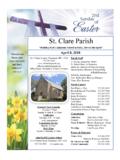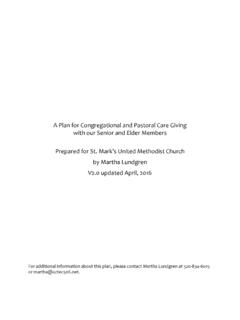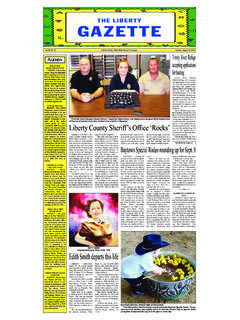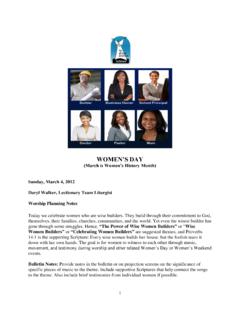Transcription of A Theology of Missional Preaching
1 A Theology OF Missional Preaching . BY. REV. KARL A. SCHAFER. FIRST PRESBYTERIAN church . VISALIA, CA. DECEMBER, 2010. Introduction Everything Missional is catching on. In just over twenty years since the term Missional was coined,1 an industry has developed around the concept: There are Missional books, Missional conferences, Missional articles, Missional seminars, Missional curricula, Missional churches, and Missional consultants. Leaders and churches seem to want to associate themselves with being Missional . The term places a person within a certain theological and ecclesial arena that advocates a renovation of the church as a gathering of people carrying out the mission of God. Theologians and Christian leaders who support Missional Theology conclude that this and other Missional propositions about the church 's work must shape the church 's visible ministry. The Theology , therefore, is being applied to ways the church acts, such as teaching, worship, service and leadership.
2 One particular act central to Christian worship only beginning to be explored in light of Missional Theology is the act of Preaching . Literature Survey While there is extensive literature on Missional Theology , Missional activity, and Missional church , there is limited literature on Missional Preaching . Little published application of Missional Theology to Preaching seems to have yet been made in book or article form. That Preaching is such a cornerstone of evangelical Christianity and itself has such extensive literature, the discipline of distinctly Missional Preaching is a mine poised for exploration. The most targeted volume available on Missional Preaching is John Addison Dally's Choosing the Kingdom: Missional Preaching for the Household of 1. Darrell L. Guder, et al. Missional church : A Vision for the Sending of the church in North America (Grand Rapids: Wm. B. Eerdmans, 1998). 1. 2. This brief volume is a practitioner's guide to Missional Preaching , including a history of Missional Theology , Scriptural themes of Missional Theology relevant to Preaching , a short pattern for making Preaching Missional , and exercises to find a biblical mandate for Missional Preaching .
3 Dally's book was part of the literature highlighted at a workshop sponsored by the Presbyterian church (USA) on Missional Preaching in 2009. and 2010. This Academy for Missional Preaching provided three cohorts of 25 pastors each the chance to learn about and practice Missional Preaching . Other than Dally's book on Missional Preaching , no other published literature available at the workshop discussed Missional Preaching in any depth. Even a survey of Dally's notes and bibliography reveal no other published literature specific to Missional Preaching . Toward a Theology for Missional Preaching It is the purpose of this paper to offer an abbreviated Theology for Missional Preaching . A comprehensive Theology for Missional Preaching would require far more space than allocated here. The growing acceptance of Missional thinking and the priority of Preaching in evangelical worship welcome such consideration.
4 Furthermore, Preaching in the current Missional context could easily adopt the attractive or popular qualities of striving to be Missional , resulting in a weak, faddish style of Preaching . A strong, supporting backbone of a Theology for Missional Preaching is necessary for Preaching to be influenced to the same extent as Missional Theology attempts to change other facets of the church . To work toward a Theology of Missional Preaching , this paper will: first, offer a brief history of Missional Theology ; and second, list and link hallmark themes of Missional Theology with the act of Preaching . 2. John Addison Dally. Choosing the Kingdom: Missional Preaching for the Household of God (Herndon, VA: Alban Institute, 2008). 3. A Brief History of Missional Theology Karl Barth is widely understood to be the primary figure in launching the foundational thought leading to what is now called Missional Theology .
5 Although Barth did not use the term Missional Theology , he did speak of the partnership of mission and Theology and their influence on each Barth's ecclesiology led to the conclusion that for the church mission is not secondary to its being; the church exists in being sent and in building up itself for the sake of its own being. 4. During the ensuing two decades, the church developed extensive literature on the connection between mission and Theology . Terminology such as Theology of mission and mission Theology was used to describe God's mandate for the church 's mission character. This topic captivated theologians after Barth in the 1930s because of western cultural changes that demanded the church 's attention. The church found itself in a very different landscape compared with recent centuries. Beginning most distinctively with the Constantinian era of Christianity, the church could generally be characterized as an institution increasingly focused on self-preservation.
6 The legalization and even promotion of Christianity by the government bolstered Christianity's visibility and softened its mission intensity. Since the Roman Emperor and governing structure secured Christianity's place in society, the immediacy of evangelism and mission were often compromised. Over time, this affected the church 's understanding of mission. Rather than being the purpose and character of the church , mission became one thing among many that the church did. With governments, families and individuals serving as 3. Darrell L. Guder, From Mission and Theology to Missional Theology The Princeton Seminary Bulletin 24, no. 1 (2003): 47. 4. Ibid., 46. 4. benefactors for the church institution, there was little internal pressure to promote mission and evangelism. The church realized that it could survive on its own. Not until the cultural changes of the middle 1900s was the church spurred to re- think its own identity.
7 Called the de-Christianizing era in Europe and America, this period witnessed a culture of people who no longer accepted and supported the Christian church institution out of heritage. The church could neither rest on its prior reputation because it was no longer valued nor count on the loyalist mentality of previous generations because they no longer existed in younger generations. People questioned their faith and the church and wanted to see how the church was being the church it claimed to be. This sense of crisis sent scholars and theologians to the Bible in an effort to recapture an identity for the church strong enough to address the culture's demands. The search for a new identity and orientation of the church intersected with the questions Barth and others were raising about the church 's relationship to mission. David Bosch described the thought process as changing from a church centered mission to a mission centered church .
8 5 A portion of theologians and church leaders were being swayed toward the idea that the church was in essence a missionary endeavor. A decisive movement was taken by scholars from the Gospel and Our Culture Network when they began researching the question, If one were to do one's ecclesiology missiologically, what would it look like? The findings from that study were published in 1998 as Missional church : A Vision for the Sending of the church in North America. Missional Theology , therefore, was born out of a quest to define the church 's identity as mission. Since that time, the term Missional Theology and its perspective is working into the language of church leaders and the orientation of congregations. The reaction to 5. Ibid., 43. 5. Missional Theology is evident in the flood of literature that applies the Missional church view to church ministry. church leaders are making a thorough investigation of the implications of Missional Theology for the church and its ministry.
9 Themes of Missional Theology for Missional Preaching The identity of the church that Missional Theology provides is best represented in themes. These themes are the milestone theological shifts that have occurred and continue to occur in reorienting the church toward a Missional identity. A helpful step in developing a Theology of Missional Preaching involves highlighting and linking these themes to the task of Missional Preaching . Just as these themes are central to Missional Theology , these themes help create a framework for Missional Preaching . Following are five hallmark themes from Missional Theology and how they connect to the task of Missional Preaching . Theme 1: The church 's mission and the missio dei The term missio dei is Latin for mission of God or sending God . It refers to God's initiated activity of redeeming people for himself through people God sends. For example, God sent individuals ( the patriarchs from Genesis), families ( the twelve sons of Jacob), the nation of Israel, Israel's kings, prophets, and finally the church though Jesus Christ.
10 Karl Barth is widely credited with providing the groundwork for the missio dei concept to be developed into a fundamental theological His writing on the subject articulates the relationship between the church and the mission of God: The congregation, the so-called homeland church , the community of heathen Christians, should recognize themselves and actively engage themselves as what they essentially are: a missionary community! They are not a mission association 6. Ibid., 42. 6. or society, not a group that formed itself with the firm intention to do mission, hut a human community called to the act of mission. 7. The concept of missio dei is perhaps most foundational for Missional Theology in that it recaptures the idea that God is continuing to fulfill God's own mission for creation and it returns the church 's priority to God's mission over against any other The concept of missio dei corrects the false idea that mission is a segment of the church 's ministry and something the church does.








